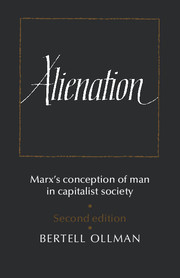Book contents
- Frontmatter
- Contents
- Preface to the second edition
- Note on translations
- Acknowledgements
- General introduction
- PART I PHILOSOPHICAL INTRODUCTION
- PART II MARX'S CONCEPTION OF HUMAN NATURE
- PART III THE THEORY OF ALIENATION
- 18 The theory of alienation
- 19 Man's relation to his productive activity
- 20 Man's relation to his product
- 21 Man's relation to his fellow men
- 22 Man's relation to his species
- 23 The capitalist's alienation
- 24 The division of labor and private property
- 25 The labor theory of value: labor-power
- 26 Value as alienated labor
- 27 The metamorphosis of value
- 28 The fetishism of commodities
- 29 Class as a value Relation
- 30 State as a value Relation
- 31 Religion as a value Relation
- 32 Marx's critique of bourgeois ideology
- PART IV CONCLUSION
- Appendix I In defense of the philosophy of internal relations
- Appendix II Response to my critics: more on internal relations
- Notes to the text
- Bibliography of works cited
- Index of names and ideas
- Cambridge Studies in the History and Theory of Politics
21 - Man's relation to his fellow men
Published online by Cambridge University Press: 05 June 2012
- Frontmatter
- Contents
- Preface to the second edition
- Note on translations
- Acknowledgements
- General introduction
- PART I PHILOSOPHICAL INTRODUCTION
- PART II MARX'S CONCEPTION OF HUMAN NATURE
- PART III THE THEORY OF ALIENATION
- 18 The theory of alienation
- 19 Man's relation to his productive activity
- 20 Man's relation to his product
- 21 Man's relation to his fellow men
- 22 Man's relation to his species
- 23 The capitalist's alienation
- 24 The division of labor and private property
- 25 The labor theory of value: labor-power
- 26 Value as alienated labor
- 27 The metamorphosis of value
- 28 The fetishism of commodities
- 29 Class as a value Relation
- 30 State as a value Relation
- 31 Religion as a value Relation
- 32 Marx's critique of bourgeois ideology
- PART IV CONCLUSION
- Appendix I In defense of the philosophy of internal relations
- Appendix II Response to my critics: more on internal relations
- Notes to the text
- Bibliography of works cited
- Index of names and ideas
- Cambridge Studies in the History and Theory of Politics
Summary
The third broad relation in which Marx exhibits the worker's alienation is his tie with other men. This social alienation is fitted on to activity and product alienation in the following manner:
If the product of labor does not belong to the worker, if it confronts him as an alien power, this can only be because it belongs to some other man than the worker … man's relation to himself only becomes objective and real for him through his relation to other men. Thus, if the product of his labor, his labor objectified, is for him an alien, hostile, powerful object independent of him, then his position towards it is such that someone else is master of this object, someone who is alien, hostile, powerful, and independent of him … Every self-estrangement of man from himself and from nature appears in the relation in which he places himself and nature to men other than and differentiated from himself.
The hostility of the worker's product is due to the fact that it is owned by a capitalist, whose interests are directly opposed to those of the worker. The product serves Marx as both the mask and the instrument of the capitalist's power.
If, when describing capitalists, Marx states they are but personal embodiments of capital, he is equally able to assert, when dealing with capital as a product, that it is an expression of the real power of the capitalist.
- Type
- Chapter
- Information
- AlienationMarx's Conception of Man in a Capitalist Society, pp. 147 - 149Publisher: Cambridge University PressPrint publication year: 1977

